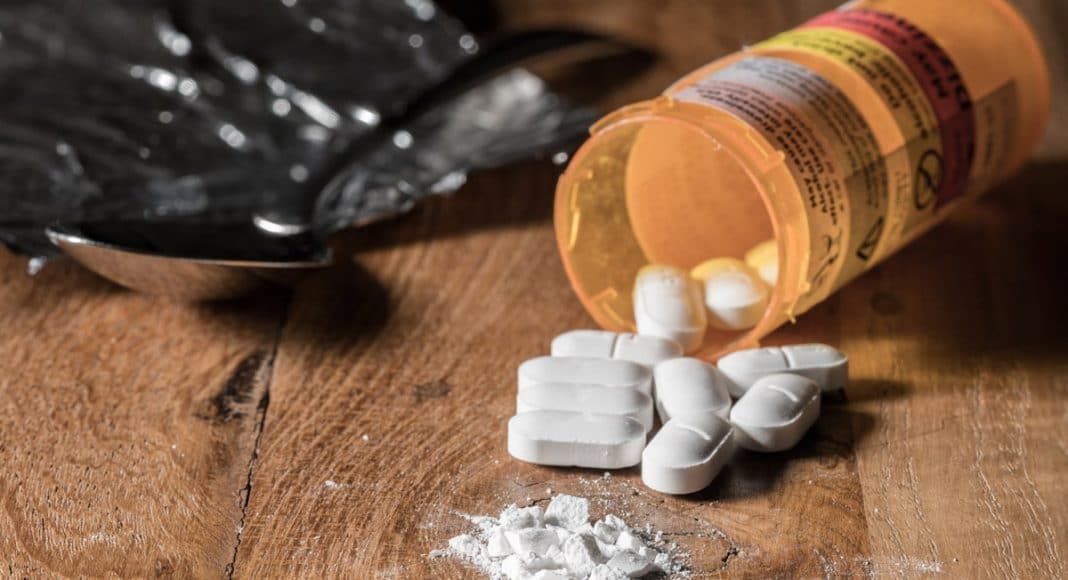Last month, President Donald Trump declared the opioid overdose crisis “a national health emergency” and assured the American people that “we can be the generation that ends the epidemic.” But in Trump’s major announcement was short on substance.
In the Oct. 26 speech, he reiterated the false notion that building the US-Mexico wall would stop the flow of drugs into the country. His other major “really tough, really big, really great” advertising campaign that would convince Americans never to do drugs in the first place.
Drug policy experts were not impressed and hoped that Trump’s special commission on the opioid crisis, led by New Jersey Gov. Chris Christie, would fill in the gaps.
On Wednesday, the opioid commission revealed its report and it, indeed, is more specific than Trump’s vague proposals. The panel lists 56 recommendations in The President’s Commission On Combating Drug Addiction And The Opioid Crisis, highlighted by a call for more drug courts and easier access to opioid alternative for pain patients.
Missing from the 56 suggestions, is any consideration for cannabis as a pain therapy. The report not only dismissed medical marijuana as a possible treatment to help get opiate addicts, it took an illogical swipe at the idea. In a letter addressed to Trump, Christie wrote:
“The Commission acknowledges that there is an active movement to promote the use of marijuana as an alternative medication for chronic pain and as a treatment for opioid addiction. … The Commission found this very disturbing. There is a lack of sophisticated outcome data on dose, potency, and abuse potential for marijuana. This mirrors the lack of data in the 1990’s and early 2000’s when opioid prescribing multiplied across health care settings and led to the current epidemic of abuse, misuse and addiction. The Commission urges that the same mistake is not made with the uninformed rush to put another drug legally on the market in the midst of an overdose epidemic.”
Christie’s statement flies in the face of science. There are plenty of research demonstrating that legal cannabis access is associated with reduced rates of opioid use, spending, abuse, hospitalization, and mortality. The National Institute on Drug Abuse recently updated its webpage on marijuana, specifically detailing its ability to lower the use of prescription opioids in states where it is legal.
-
Related Story: Why Trump’s Drug Addiction Task Force Should Freak You Out
Cannabis is effective at treating chronic pain and many patients have chosen an herbal solution rather than prescription opiates. Clearly, more studies need to be done, but for a governmental commission to shut down the possibility is troubling.
But the report is not surprising, considering who is on the committee. As Vice News reports:
Christie, a former federal prosecutor, has previously railed against marijuana legalization, calling it “beyond stupidity” and describing tax revenue from legal weed sales as “blood money.”
“We are in the midst of the public health crisis on opiates,” Christie said in a speech in May. “But people are saying pot’s OK. This is nothing more than crazy liberals who want to say everything’s OK. Baloney.”
Other members of the opioid commission have also publicly opposed marijuana legalization. Dr. Bertha Madras, a Harvard Medical School professor and the former deputy director for demand reduction in the Drug Czar’s office, has advocated for keeping weed in the same restrictive category of illegal drugs as heroin. Gov. Charlie Baker of Massachusetts, where voters approved a recreational marijuana law last year, said previously that “marijuana is not safe” and causes “severe mental health issues.”
Another committee member, former Congressman Patrick Kennedy, who is a recovering opioid and alcohol addict,has spent the last six years railing against marijuana legalization. He has called marijuana is a “Trojan horse” and warned that cannabis consumption is a “hazard to public health.” Since 2013, he has been involved with Smart Approaches to Marijuana, an anti-marijuana organization led by Kevin Sabet.
There were many positive recommendations in the report, but the Trump administration’s anti-science rhetoric remains a concern to drug policy advocates. “President Trump’s remarks on the opioid overdose crisis last week emphasized a ‘just say no’ approach and escalating the drug war,” said Grant Smith, deputy director of national affairs with the Drug Policy Alliance. “The opioid commission was a mixed bag, with some good public health recommendations. The question now is how will they stand up to President Trump’s punitive approach to the opioid overdose crisis?”
More than half a million Americans died of drug overdoses from 2000 to 2015, according to the Centers for Disease Control and Prevention. Each day, 91 people in this country die from an opioid overdose — more than 33,00o a year. Drug overdose is the leading cause of accidental death in the U.S. and opioid addiction is driving this epidemic. In 2015, more than 20,000 overdose deaths were reported related to prescription pain relievers, with another 13,ooo overdose deaths related to heroin.


